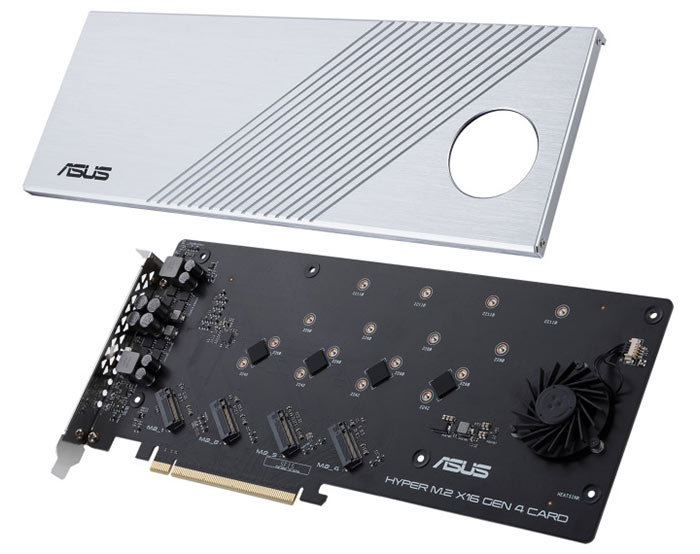Asus has unveiled its Hyper M.2 X16 Gen 4 card at CES 2020. As you will have already guessed from the name this is an add-in card for storage expansion. Extra/flexible storage expansion options are always useful, however the most interesting thing about this card is the potential data transfer speeds it can facilitate.
In its EdgeUp blog post about the Hyper M.2 X16 PCIe Gen 4 card Asus includes a pre-amble about the bandwidth that is available to RTX40 chipset motherboard / Ryzen 3000 CPU users. An abundance of double bandwidth PCIe 4.0 lanes is available to users of this AMD platform and Asus says that its new add-in-card is one way to "tap into the incredible bandwidth of PCIe 4.0," and create a super fast storage sub-system.

In essence the Asus Hyper M.2 X16 PCIe Gen 4 card offers four M.2 slots, each with four lanes of PCIe 4.0 connectivity. For flexibility the four diagonally positioned slots can fit M.2 cards in 2242, 2260, 2280, and 22110 form factors (first two digits are the width, and the following digits indicate length in mm).
Asus's card supplies up to 14W power to each M.2 SSD on board which is enough for them to run "at full potential" according to the PC, devices and components maker. And, for example, Asus says you could populate the card with four 2TB PCIe 4.0 SSDs, set up a RAID 0 configuration, "and enjoy massive 8TB storage array able to communicate using up to 256Gbps of potential bandwidth". It claims this performance is 4x a single PCIe 4.0 SSD and as much as 8x faster than the currently mainstream PCIe 3.0 SSDs.
Sometimes SSDs can throttle if heavy activity causes overheating, so Asus has included a blower fan in the new card, as well as thermal pads for your installed drives to make contact with the large brushed aluminium shroud. A dip switch is available on the fitting bracket if you can do without the active cooling. Also you will find four activity LEDs present on the bracket.

Last year, at Computex in June, Gigabyte showed off a very similar card called the Aorus AIC Gen4 SSD. It was claimed to offer sequential read/write speeds at 15,000/15,000MB/s, and its cooler looked more substantial - said to include a "copper thermal solution". This AIC launched in November. Inside the Aorus card you can see the arrangement of M.2 slots might be better than the new Asus product for active fan cooling air flow.






